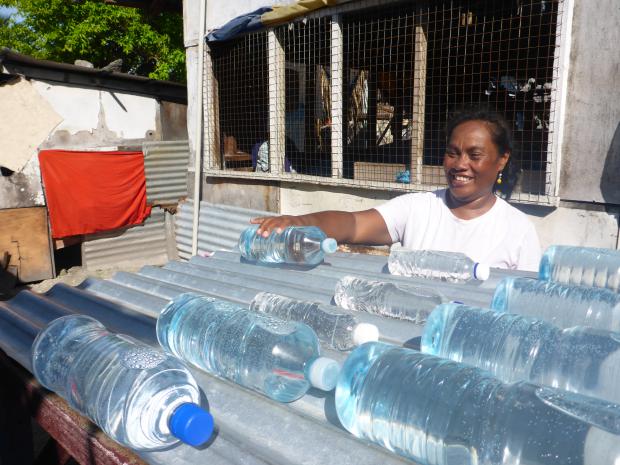Low cost solar water disinfection campaign rolled out in Kiribati
Discussion details
This week, a national campaign was launched in Kiribati to roll out solar water disinfection (SODIS) to improve health and curb diarrheal diseases throughout the country.
SODIS is a simple, low cost method to disinfect contaminated drinking water. While endorsed by the World Health Organisation in 2000 and used globally by more than 10 million people, the method is relatively new to the Pacific Island region.
The decision by the Ministry of Health and Medical Services (MHMS) to roll out SODIS nationally marks a turning point in Kiribati and the Pacific.
“This is an exciting moment in Kiribati, as SODIS can now be taught across Kiribati to help improve the health of our people. Based on the research and the campaign in the Bairiki community, we now know that SODIS works to curb diarrheal diseases. Rolling out the campaign nationally is a huge endeavour, and one that requires extensive support and partnerships at all levels” remarked Mr Tebikau Tibwe, Chief Health Inspector, MHMS Environmental Health Unit.

Prior to the national launch, a SODIS – Cheap - Simple - Safe campaign was conducted over a 6-month period in the Kawan Bairiki community, one of the lowest income and most densely populated communities of South Tarawa, Kiribati. Here water sources are often contaminated with bacteria, and families struggle daily to secure safe drinking water.
The campaign was designed and launched by the European Union funded Global Climate Change Alliance: Pacific Small Island States (GCCA: PSIS) project, implemented by the Secretariat of the Pacific Community (SPC), and carried out in collaboration with the Kiribati MHMS – Environmental Health Unit and the Office of Te Beretitenti (the President).
The SODIS method involves exposing water to the sun in clear bottles on a reflective surface for 6 hours. The combined effect of ultraviolet radiation and heat from the sun results in water that is safe for consumption. A scientific research study was conducted in Kiribati prior to the campaign launch.
“We have found out that the SODIS method is better than boiling water for disinfection purposes. It is simpler, cheaper, reliable, less time consuming, provides job opportunities, and even tastes better. But the overall driver for our families to use SODIS is to improve their health” explains Mr Tianuare Taeuea, the GCCA: PSIS project officer in Kiribati.

In Kiribati, water borne diseases such as diarrhoea are a major concern to households and MHMS, as they account for the nation having the highest child mortality rate in the Pacific, with 63 out of every 1,000 children not living until their 5th birthday.
“SODIS has significantly decreased the number of diarrhoeal and respiratory diseases across our community, especially in women and children. This makes a huge difference in our lives, as our families are happier and healthier and our children are able to attend school much more regularly. We are very thankful to the donors and Government of Kiribati for selecting our community for this project’’ says the community campaign leader, Ms Teretia Tabutoa.
The GCCA: PSIS project is a EUR 11.4 million project funded by the European Union, implemented regionally by the Secretariat of the Pacific Community and nationally by each of the nine participating governments. In Kiribati, project activities focus on environmental health surveillance and response to climate sensitive health risks.
Further information:
Solar water disinfection in Kiribati: Assessment and implementation of solar water disinfection systems by Christian Starz.
For more information, contact Juliana Ungaro, Climate Change Adviser, GCCA: PSIS, SPC, Suva, Fiji (Tel: +679 337 9393; email: julianau@spc.int) or Zhiyad Khan, Project Communications Assistant, GCCA: PSIS, SPC, Suva, Fiji, (Tel: +679 337 9349; email: ZhiyadK@spc.int).
Log in with your EU Login account to post or comment on the platform.